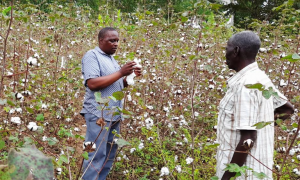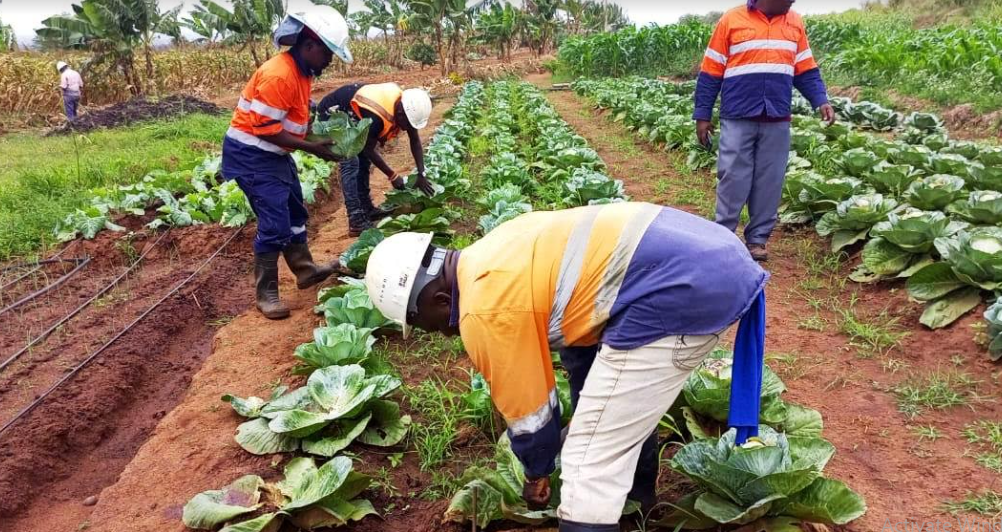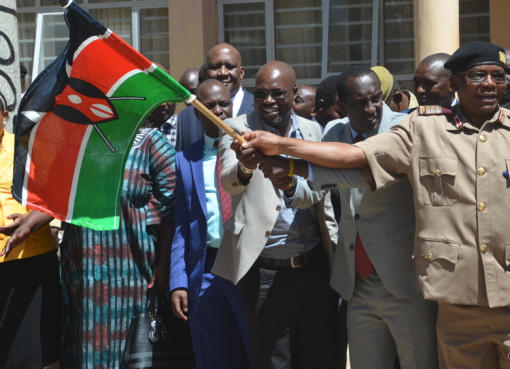Kwale-based Australian mining firm Base Titanium is undertaking ecological agricultural reclamation in mined-out areas.
Base Titanium and agronomists from Kilifi-based Pwani University have been carrying out research and trials to find out the viability of mined-out land for growing crops at the Kwale mine.
The trials suggest that the rehabilitated mined land and infrastructure can be suitable for agricultural activities.

Stakeholders contend that the use of mined-out lands for agricultural purposes has been a largely unheralded success story in the country, which gives substance to sustainable mining.
Base Titanium owns and manages Kwale Sand Operations, a high-grade mineral sands mine which commenced production in 2013.
The Kwale Operation features a high-grade ore body with a high-value mineral assemblage rich in rutile, ilmenite, and zircon, which are all considered critical minerals.
Mining initially commenced on the Central Dune orebody before transitioning to the South Dune orebody in 2019, and the Kwale Operation currently accounts for approximately 65% of Kenya’s mining industry by mineral output value.
The Kwale Mine Operation is officially accredited as a Kenya Vision 2030 flagship mining project.
Base Titanium is slowly transforming post-mining land into farming areas for sustainable development and poverty alleviation.
It is directly facilitating programmes to get more farmers actively involved in producing crops on mined-out lands while at the same time forging special marketing arrangements for the crops being grown under the programmes.
The mining firm, in partnership with agricultural experts from Pwani University, has been conducting research and trials on the viability of various crops, including maize, cotton, sorghum, cassava, and fruit trees, to see if they can grow well in rehabilitated areas where mining has already been done.
Other crops and plants currently being grown on already mined-out land include pineapples, bananas, improved cassava, ginger, cashew nuts, and rice, among others.
Base Titanium External Affairs General Manager (GM) Simon Wall says the reclaimed land is being used for agriculture on a priority basis.
Mr. Wall says Base Titanium is committed to operating in a sustainable and environmentally responsible manner and that research and trials on the viability of agriculture on mined-out land are still ongoing.
He says the mining company is transforming post-mining land into farming areas for sustainable development and poverty alleviation.
“Agricultural trials in partnership with Pwani University are ongoing with great success in terms of the variety of food crops that can be produced,” he said, adding that its mined-out land will contribute to food security.
Mr. Wall says environment and mining teams have been spearheading rehabilitation efforts to return mined-out land at the Kwale operations to its former state or even better.
He says Base Titanium is routinely rehabilitating areas disturbed by mining activities to a condition that is safe, stable, and non-polluting.
Wall says restoration and rehabilitation of land and soils after mining activities is gathering pace even as Base Titanium is actively seeking to extend the life of Kwale Operations through its near-mine and regional exploration programmes.
He says in an effort to extend Kwale Operation’s mine life beyond December 2024, the mining company is seeking to identify additional mineral deposits that may lie in proximity to the existing operational zones.
“Our post-mining rehabilitation activities are turning former mining sites into areas of productive farming,” said Wall.
He says as Base Titanium approaches closing the mine in 2024, it is slowly transitioning into post-mining land use (PMLU), adding that sustainable conservation is one of the key components of Base’s PMLU programme.
The top mining official says sustainable conservation, rehabilitation, and ecological restoration programmes are now focused on the mined-out areas of the South and Central Dunes.
He says they are undertaking various sustainable conservation activities, which are critical components of the mining company’s post-mining land use programme.
Wall says Base Titanium has created world-class conservation and biodiversity programmes at Kwale Operations as a part of its biodiversity, rehabilitation, and ecological restoration strategies.
He says the mining firm can build on these conservation programmes by converting areas within the mine site and buffer zones into conservation sites with various eco-tourism activities.
The External Affairs General Manager says Base Titanium has also started facilitating agricultural field days for local farmers to train them on agricultural best practices and new methods of farming, including irrigation, how to improve their yields, and the aspect of crop rotation.
“The programme also involves farmers getting a glimpse of our agricultural trial areas, where research on various crops on mined-out land is being done,” he said.
Rehabilitation of mined-out areas begins by shaping the area into dunes similar to those that existed before mining to ensure natural drainage areas are followed.
After that, shaping, topsoil spreading, manuring, and mulching are done to enhance soil organic matter and prepare for vegetation.
Maize farmers supported by Base Titanium are enjoying a bumper harvest this season following the good rains experienced.
“When I look at my neighbours’ crops now, I am way ahead of them. It was not always this way,” said Mwanahamisi Mwabuni, a farmer in the Maweche area.
Base’s agricultural programmes were developed as a way of ensuring farmers in Kwale experienced a lasting positive impact from its mining operations.
Focusing on agriculture is aimed at improving livelihoods and ensuring lasting food security.
To help ensure sustainability and improve efficiencies, farmers participating in Base’s agricultural programmes have formed themselves into a co-operative society called “Kwale Pamba na Viazi (PAVI)”. This approach has been instrumental in helping to link farmers with markets as well as providing farm inputs and extension services.
Through Base Support and PAVI, more than 2,500 smallholder farmers in Kwale have now taken up cotton farming.
Stakeholders say the matter of putting mined-out, reclaimed land to productive and profitable use is a priority for the national government in light of the growing demand for land for agricultural uses.
Recently, Base Titanium launched the MKUKI Kwale Project, an agri-business research project, as a way of improving food security in the county.
The project, which will be implemented by the Kwale PAVI Co-operative in partnership with Business for Development (B4D), Australian Aid, Kalro, and Pwani University with funding from the Australian Government, will benefit 6,500 farmers across Kwale County.
Kwale Deputy Governor Chirema Kombo says the funding will assist small-scale farmers who need assistance from cooperatives to increase and intensify agricultural sustainable systems productivity, ensure food production and security, and increase value addition.
Kombo said resolving the contradiction between resource exploitation and environmental protection has become imperative for achieving good ecological mining areas.
By Hussein Abdullahi





